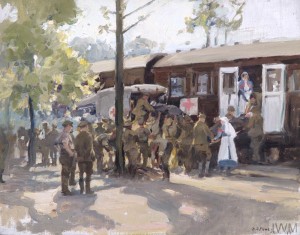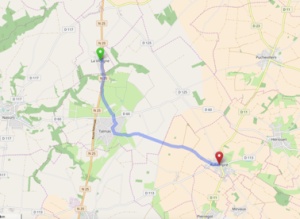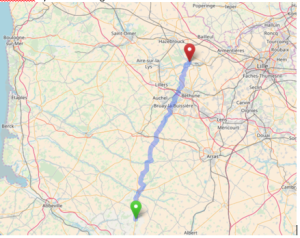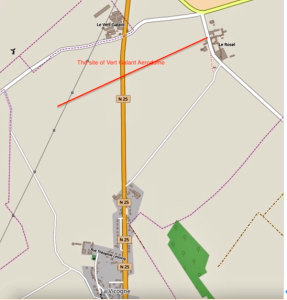Monthly Archives: April 2018
12th to 16th April 1918 Friday to Tuesday
A Cold Sponge Down by a Middle Aged Nurse!
All material produced or reproduced here and throughout this work is the sole copyright of the author and the family of Doctor D.C.M. Page MC.
“On Friday 12th we packed up, and marched via Talmas to Rubumpre. We pitched our tents in a field outside the village, and had a splendid view of the surrounding country.
I hadn’t felt at all well for some time – not since getting a whiff of gas whilst with the Artillery – and at night on the 13th April felt very seedy. Next day my throat and chest were very painful. My temperature was above normal, and I felt decidedly rotten. As we were to move on again that day, the Colonel very reluctantly decided to send me back to the Casualty Clearing Station at Gezaincourt. So I was packed off there in an ambulance car feeling very miserable, and grieved at having to leave all my good friends. I was a patient in No. 45 C.C.S. for one night only, being evacuated by ambulance train at 8.30 p.m. on the 15th. It was a terribly slow journey – we didn’t reach Rouen until 3 p.m. on the 16th April! However, it was a beautifully equipped and most comfortable train. I was a stretcher case and felt very ill. My throat was completely closed up, and very painful. The doctor in charge of the train was a Captain Cowans, whom I knew as a resident house surgeon with Mr Cathcart in Edinburgh Royal Infirmary. At Rouen we were conveyed by motor ambulance to No. 2 British Red Cross Hospital, and after a lot of lying about on my stretcher in vestibules and corridors, I was at length heaved into bed between lovely cool sheets, and felt some better and happier after a cold sponge down by a dear of a Scottish sister (middle-aged!). The doctor – Major Hudson – came to see me in my little room, and told me that my throat and air passages were very badly ulcerated, and must have been so for some considerable time. I was unable to speak or swallow. He prescribed gargles, inhalations and compresses externally. I didn’t sleep – hadn’t had a wink for days now.”
It seems that Douglas had now succumbed to the “mouthfuls” of gas from the attack on March 11th. From the slightly embarrassed mention of the “cold sponge down” it would seem that he was suffering from the effects of mustard gas poisoning. This would often manifest with blistering of the body as well as the ulceration of the throat and respiratory organs. (More on the use and effect of gas in an additional post).
The slow train journey to Rouen was to mark the end of Douglas’s adventures on the Western Front but not the end of his war. That was over a year away.

A Red Cross Train, France; wounded British soldiers are transferred from a motor ambulance to a Red Cross train, 1918, artist Harold Septimus Power. (Art.IWM ART 1031) image: Copyright: © IWM. Original Source: http://www.iwm.org.uk/collections/item/object/22039
Find out about our connection with Dr Page and an introduction to his diary here
10th April 1918 Wednesday
Depressing news from the north
All material produced or reproduced here and throughout this work is the sole copyright of the author and the family of Doctor D.C.M. Page MC.
“On the 10th April we heard of the Hun attack ‘up North’ where he has captured the Messine Ridge, Armentiers, Laventie, Fleurbaix, Sailly, Bac St Maur, etc. The ‘Pork and Beans’ (Portuguese) bolted without firing a shot, and let the enemy through. For two hours this evening a continuous cavalcade of our cavalry went through our village on the way north to stem the attack. It was a wonderful sight. They are making a forced march all night, and have to be in in Merville by 8 a.m. tomorrow.”
The Long March North to Merville.
We don’t know where the march began but there was a crippling 82 kms to go to reach Merville by the morning.
Find out about our connection with Dr Page and an introduction to his diary here
1st and 2nd April 1918 Monday and Tuesday
No Fooling Today, Instead a Difficult Train Journey
All material produced or reproduced here and throughout this work is the sole copyright of the author and the family of Doctor D.C.M. Page MC.
“On Monday, 1st April, we marched to Calonne where we entrained. It was hard work getting the horses on board. The train left at 12.10 a.m. on 2nd April, and we were in the train until noon. We detrained at Doullens, very dirty, tired and hungry.
However, we got no respite until we had marched 8 miles along the main Doullens-Amiens road to a little village named La Vicogne. Our men were under canvas in a field, whilst the officers slept on the floor of a room of a big farmhouse. There was a large aerodrome near us. The road was very busy with transport of all kinds.
We were now in the 5th Corps with the 2nd, 12, 17th, 47th, 63rd and 1st New Zealand Divisions, and are in 3rd Army reserve.”
Douglas so far, hadn’t mentioned his recent inhalation of gas received during the attack on the 11th March. Three weeks had passed, but typically for him he makes no mention of it, although it must have been troubling him. A few mouthfuls would not have exactly gone unnoticed.
The work of a Captain in the Royal Army Medical Corps had proved difficult enough but also varied in his duties. Instead of attending to the sick and wounded, it was now necessary to help load reluctant horses into a train and commence another slow journey south. Today this 68 kilometre journey is no longer possible by train.
Douglas and the men he looked after were ordered south to Doullens as part of the effort of attempting to plug the gap caused by the breakthrough of German forces following the start of Operation Michael (The first part of the Kaiser’s Spring Offensive) on the 21st March. Sixteen divisions of the British army were now faced by fifty eight German divisions. Many of them battle hardened, but had had some rest time after withdrawal from the east. They had spent time training in their occupied lands behind the front line since their arrival.
The nearby large aerodrome was Vert Galant. It had been gradually expanding since being established in 1915 with the Royal Flying Corps and the Royal Navy Air Service, eventually with the Royal Air Force. It operated until 1919.
The Book by Michael O’Connor “In the Footsteps of the Red Baron” gives the very interesting and full history of Vert Galant.
Find out about our connection with Dr Page and an introduction to his diary here


